Shopify Vs. Wix — Which Is Better For eCommerce?

When entering the eCommerce world, it’s highly necessary to pick the right online store builder.
This is because your chosen platform defines everything from ease of use to advancement that you may need when your business expands over time. If you’re choosing without considering all the necessary factors, there are chances for you to face issues & limitations over time, which may come in costly.
Since you’re reading this, I assume you’re interested in two of the highly popular eCommerce stores, Shopify & Wix, to build your eCommerce website. However, both Shopify and Wix come in with great advantages, making it a real challenge to choose between them.
In this article, I promise you to explain all the necessary details for both of these platforms; be it built-in features, ease of use, scalability options, support quality, pricing, strengths, weaknesses, and many more to help you choose the best platform based on your business needs.
Are you ready to discover if Shopify or Wix works best for you? Let’s start straight with comparison.
Shopify Vs. Wix — How They Stack Up Against Each Other?
We all know that Shopify and Wix are similar platforms, sharing multiple advantages.
Understanding how they compare can help you make an informed decision, ensuring you select the right platform to grow and manage your online store. In this section, we’ll explore the key differences between Shopify and Wix, highlighting their strengths and weaknesses to help you determine which platform best fits your business.
Let’s first look at a detailed comparison table to get started.
| Key Features | Shopify | Wix |
|---|---|---|
| Theme Responsiveness | ✅ | – |
| Sales Reporting | Using Shopify Advanced | – |
| International Transactions | ✅ | ✅ |
| Blog CMS Capabilities | ✅ | ✅ |
| App Marketplace | ✅ | ✅ |
| T&C Generator | ✅ | – |
| Gift Card Accessibility | ✅ | – |
| Free Slogan Creator | ✅ | – |
| Custom Domain Name | ✅ | ✅ |
| Loans for Businesses | ✅ | ✅ |
| Customized Online Store | ✅ | ✅ |
| Credible Hosting | ✅ | ✅ |
| Drag-and-drop Builder | ✅ | ✅ |
| Trusted Payment Processors | ✅ | ✅ |
| Storage Limitation | 100+ | 50+ |
| Product Limitation | Unlimited | 50,000 |
| International Customer Assistance | 21 Languages | 9 Languages |
| Supported Languages | Around 50 | Around 90 |
This table shares a basic idea on how both of the platforms differ.
However, to make an informed choice between Shopify and Wix, you’ll need to explore each pointer in-depth. So, let’s continue with that.
1. Shopify Vs. Wix – Ease of Use
When it comes to building an online store, you need to consider a few factors – such as the setup process, ease of designing, and a manageable dashboard. Shopify and Wix, both of these platforms are designed to be user-friendly.
Until now, Shopify’s page builder used to hold the top place for being the most easiest and convenient, however, recently Wix has made a lot. Let’s climb into details.
Starting with Shopify, it comes with a user-friendly interface, a drag-and-drop builder, built-in AI functionalities, and more.
When you work with Shopify’s editor and dashboard, you get to experience simple navigation, allowing you to easily add products or customize information on your own. No matter if you’re a non-technical person, Shopify’s inventory management tools, and Shopify’s section-based editor allows you to build your pages from the ground up.
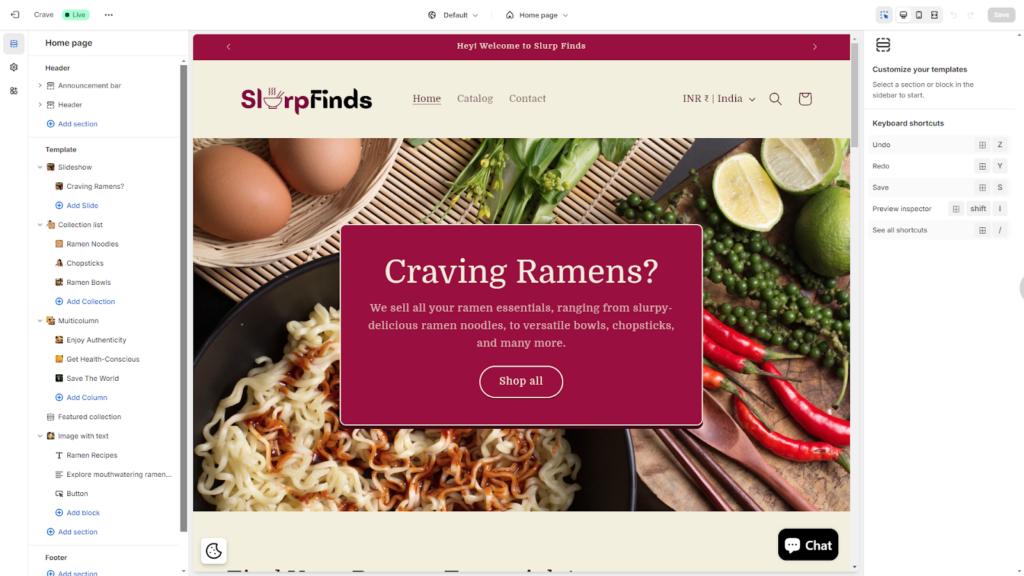
I agree that the complications associated with ease of use entirely depend on how much customization you want. So yes, if you choose a basic Shopify template, you can set it up in just a few hours.
However, a complex template can take just a couple of extra days.
Additionally, I really liked that, with Shopify, you can add products before you edit your template. All you have to do is list all your products, and later on, when you edit your theme (the frontend), you’ll see them displayed automatically.
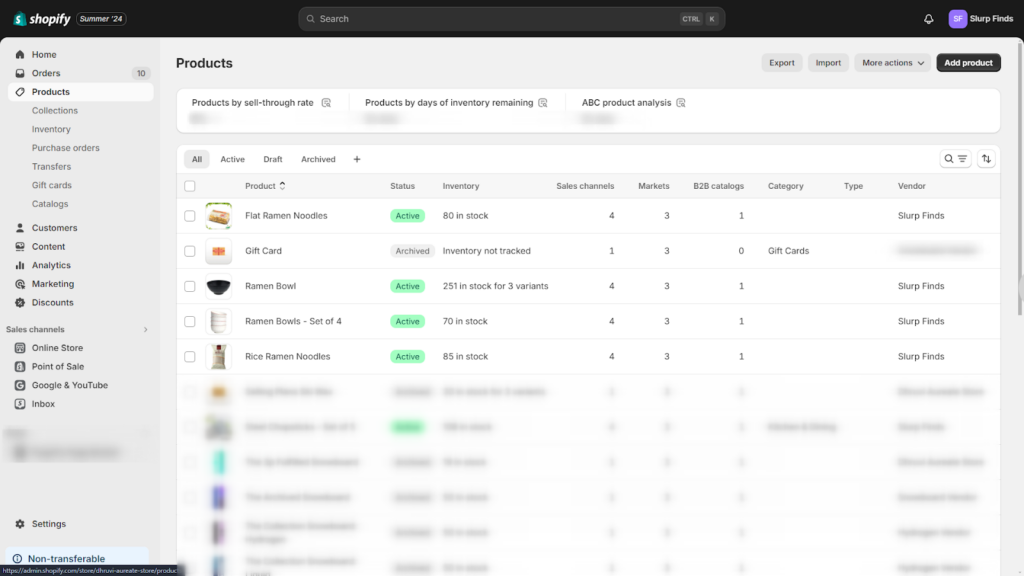
Not only that, but you also get Shopify Magic’s AI assistance to easily generate product descriptions and add new items or product variants much more easily.
On the other hand, Wix also offers a drag-and-drop editor and an easy interface to work around, making it simpler for you to set up a store.
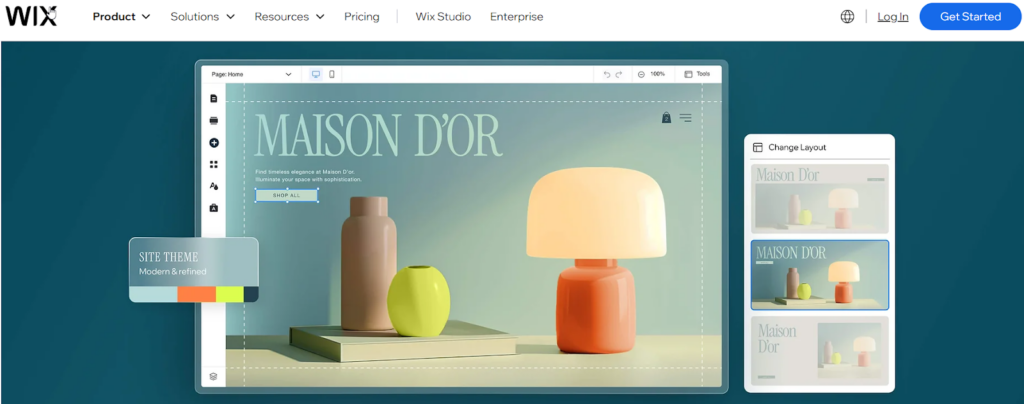
If you want to get a customized store for your business, Wix’s drag-and-drop editor is all you need. It includes multiple free templates available for various business niche. And the editor is quite to easy to operate by a non-techie.
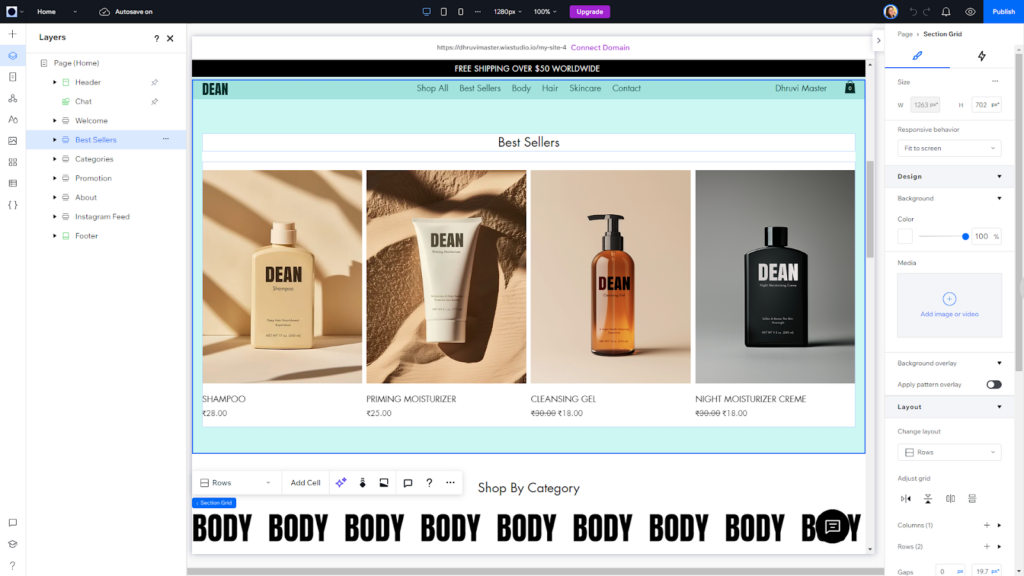
Wix also comes with an option to build a store with AI, where you business within a sentence or two, and a click to generate brings your dream online store to reality.

Here’s how easily you can build a store with Wix.

That was all, you can see that both the platforms come with greater ease of working with them.
2. Shopify Vs. Wix – Pricing
When choosing eCommerce platform, it’s price tag is biggest concern for every merchant. Since you’re looking to find right platform to power your eCommerce store, you may also have multiple questions, such as:
- Is Shopify or Wix budget-friendly?
- Does pricing packages include all necessary eCommece features?
- Is there any hidden costs that may create hurdle later on?
Let’s figure out.
Shopify Pricing
Shopify offers you five plans to choose from.
- Basic — $29/month
- Shopify — $79/month
- Advanced — $299/month
- Shopify Plus — fees are negotiable, starts at around $2,300 per month.
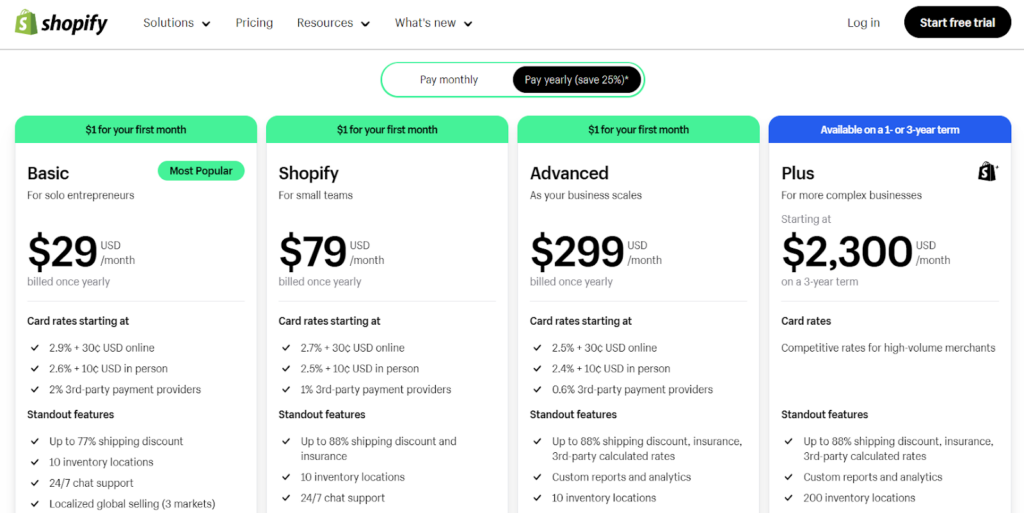
Find below the key differences in Shopify plans –
- More users with pricier plans.
- Advanced reporting starts at ‘Shopify.’
- Accurate shipping rates on ‘Advanced Shopify’.
- Multi-currency options with tax handling on ‘Advanced.’
- Shipping insurance ($200 value) on ‘Shopify’ plans.
- Faster checkouts with higher-tier plans.
Wix Pricing
There are four Wix pricing plans –
- Light – $17/month
- Core – $29/month
- Business – $36/month
- Business Elite – $159/month
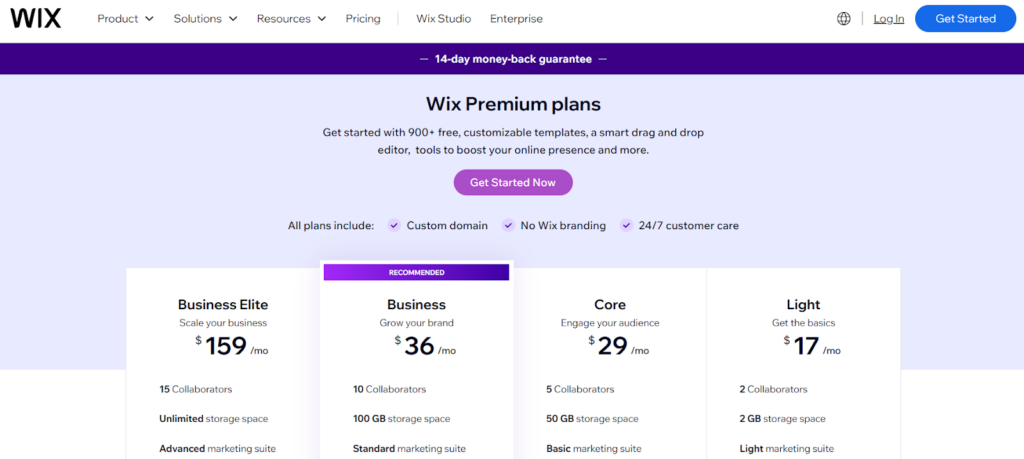
Find below the key differences in Wix plans –
- Storage depends on your chosen plan.
- Except for ‘Light,’ all the Wix plans include useful Wix apps.
- Higher-tier plans allow for complex data capture with additional fields in forms.
- Higher-priced plans also offer more hours for uploading and selling video content.
- The ‘Light’ plan lacks eCommerce features; pricier plans like Business Elite offer advanced selling tools and higher tax limits.
- Priority support comes with ‘VIP Business Elite’ and ‘Enterprise’ plans.
From the information that we discussed above, you can figure out that Wix’s starting range is quite cheaper than Shopify’s. Wix offers four pricing plans ranging from $17 to $159 per month, while Shopify provides three plans starting at $29 and going up to $399 per month.
If we talk about translation fees, both Shopify and Wix charge transaction fees on sales. Usually, the fee varies depending on factors like customer location and payment method. For Shopify, most domestic online transactions incur a fee between 2.4% and 2.9% of the sale amount, plus a flat 30 cents. It’s worth noting that Shopify’s higher-tier plans come with reduced transaction fees.
Wix also charges a transaction fee of 2.9% plus 30 cents per sale within the US.
You might see Wix to be better for pricing but it’s necessary to consider that, unlike Shopify, Wix’s transaction fees remain constant even for higher-tier pricing plans. Also, Shopify offers a 25% discount on all of its plans when you pay annually, whereas Wix offers no annual discounts.
Shopify also reduces the percentage of each sale it takes as you upgrade your plan, which Wix doesn’t do. In short, however, Shopify’s pricing plan costs a little more than Wix, they compensate well by providing you with better benefits.
That’s all. Now, let’s dive deeper and show you how both Wix and Shopify handle design and eCommerce features!
3. Shopify Vs. Wix – Design Features
The first impression is the last, and we all believe that.
And when it comes to building an online store, design plays a crucial role in user experience. It impacts how easily customers navigate your store, how well your products are presented, and ultimately, their likelihood to convert. So, let’s consider its importance and understand Wix and Shopify’s approach to design flexibility.
Starting with Wix, it comes with a user-friendly drag-and-drop editor and offers a high degree of design flexibility. When you choose to get ahead with Wix, you get over 800 free design templates to choose from and build a visually appealing store.
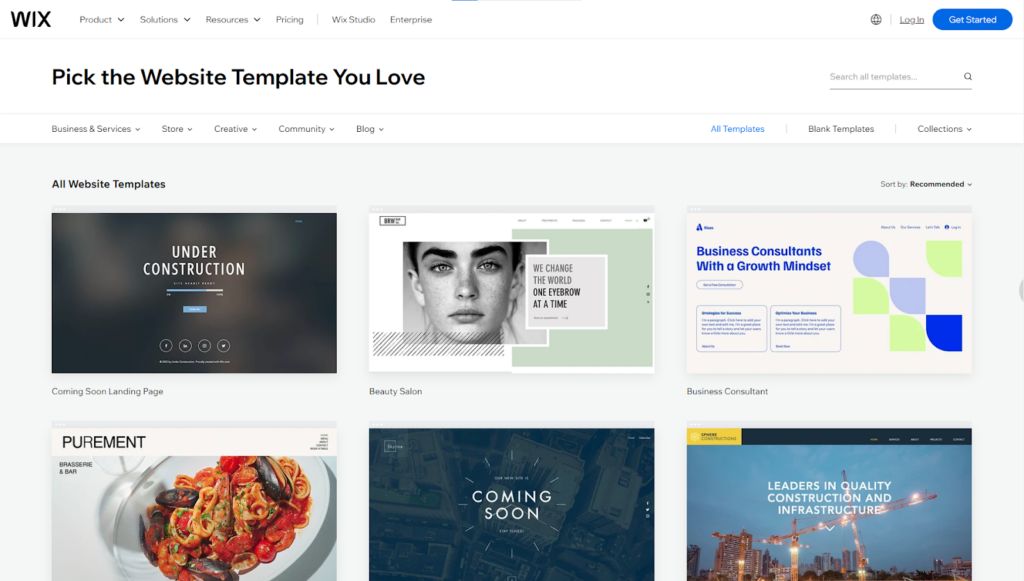
To bring in more design flexibility, Wix recently came up with an AI-powered design tool that we discussed in the previous section. This really helped Wix bring in design flexibility, where a tap to generate can build an entire store, and users can customize that based on their preferences.
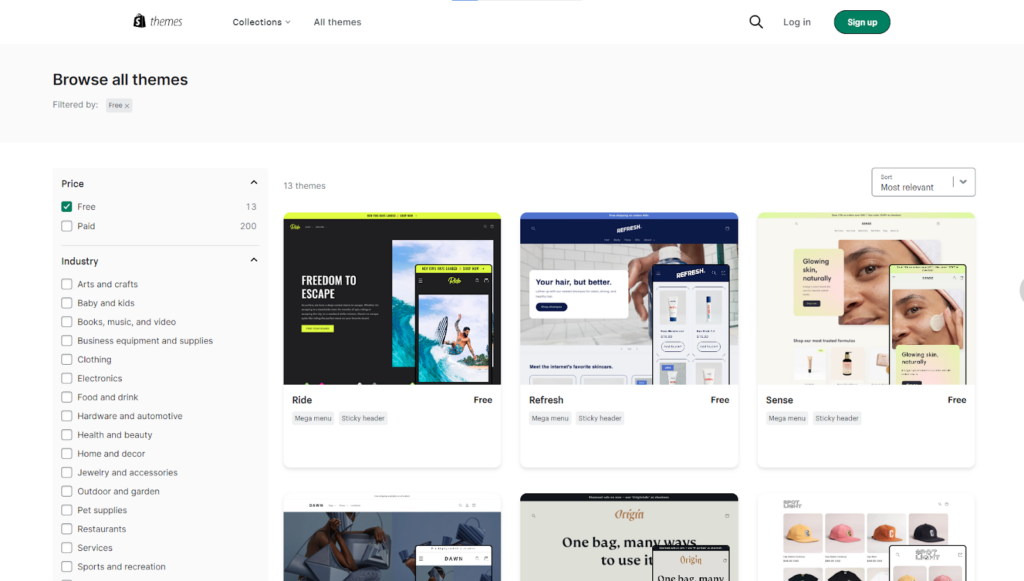
On the other hand, Shopify comes with 13 free themes, which is quite limiting in comparison to Wix. Apart from that, Shopify has a theme store, where you can purchase from around 200 themes. And yes, these themes come with a price tag, ranging from $140 to $450 on top of your base plan, and are highly customizable and designed by professionals.
Furthermore, Shopify themes are fully responsive on all devices, be it desktop, tablet, or mobile.
However, we need to consider that Wix provides templates with similar quality for free and are also easy to adjust based on your unique preferences.
4. Shopify Vs. Wix – eCommerce Features
Everything matters for building better customer experience, from navigation to payment gateways, so you need to have the right features when establishing your store.
Here I’ve listed some of the best built-in features offered by Shopify and Wix.
| Features | Shopify | Wix |
| Custom Domain Included | – | ✔ |
| SSL Certificate | ✔ | ✔ |
| Checkout on Your Domain | ✔ | ✔ |
| Abandoned Cart Recovery | ✔ | ✔ |
| Unlimited Products | ✔ | ✔ |
| Analytics | ✔ | ✔ |
| Accept Payments on Facebook, Instagram and Amazon | ✔ | ✔ |
| Customer Accounts | ✔ | ✔ |
| Gift Cards | ✔ | Available through Gifted third-party app |
| Discount Codes | ✔ | ✔ |
| Sell Digital Goods | 5 GB file size limit | 1 GB file size limit |
| Multilingual Capabilities | ✔ | ✔ |
| Automatic Tax Calculations | For USA, Europe, UK, and canadian users | For Business Unlimited and Business VIP plans |
| Mobile Apps | Shopify and Shopify POS for iOS and Android | Wix Owner for iOS and Android to manage store from mobile devices |
That was basic overview for main features that you get with both the platforms. Let’s discuss them in detail.
Shopify’s multi-channel selling allows you to integrate your store with social media and other marketplaces easily. It is an intelligent way for you to engage with an audience you are already connected with. Wix also lets you sell on marketplaces like Amazon but has limitations regarding social media platforms.
Both platforms give you immense flexibility for your customers at the checkout stages. While Shopify has over 100 payment methods to offer, Wix has about 70 options. You will get around 2.9% + $0.30/transaction fee with both Shopify and Wix.
With Shopify, you get unbeatable shipping and fulfillment perks as they own an order fulfillment network. If your business meets the criteria, your get access to Shopify Shipping that manages fulfillment and returns easily. Having a built-in shipping and fullfillment partner can save you tons of hassle.
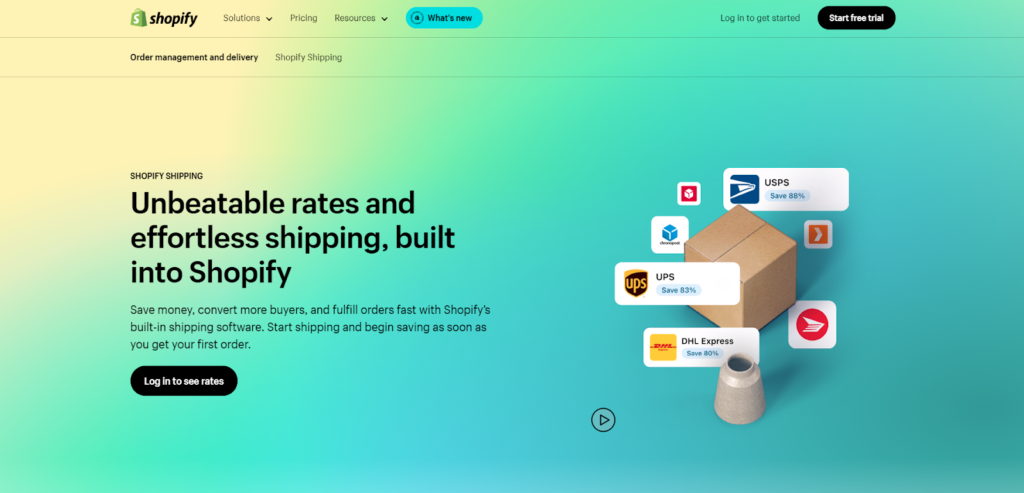
When compared for selling products, Shopify is quite strong contender. While Wix limits the number of items you can sell at 50,000, Shopify allows you sell an unlimited amount.
However, if your products come in various shapes and sizes, consider the limits on product options and variants. Product options include things like size, color, and material, while variants are combinations of these options (e.g., a large blue suede shoe).
Wix allows up to 6 product options and 1,000 variants, giving it an edge over Shopify in this area.
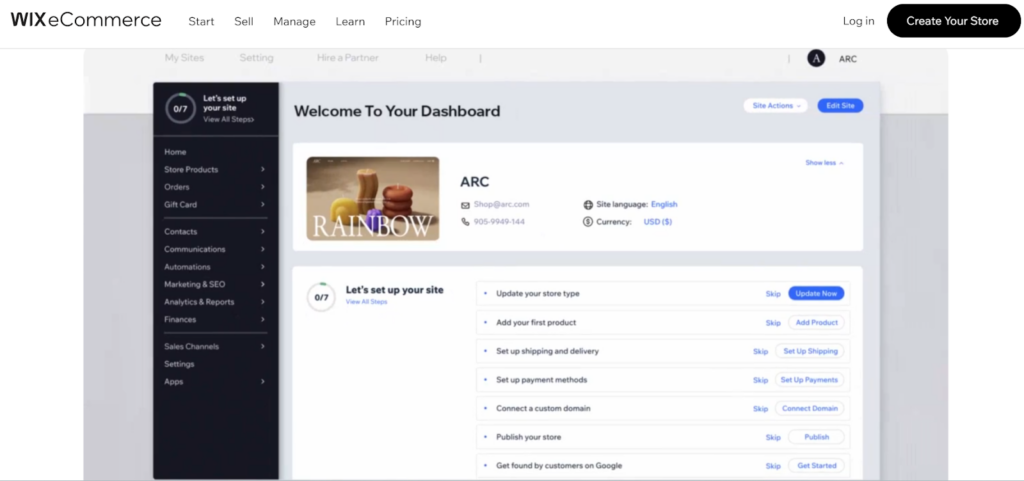
That’s all. You can see that both of the platforms offer better built-in features. And yes, for further functionalities, you’ll need to rely on third-party apps that’s readily available with them.
Let’s check more details on it.
5. Shopify Vs. Wix – Integrations and Apps
Sooner or later, you will have to integrate your online store with different apps and services to grow. Having an app store in your eCommerce platform enhances your store’s functionalities.
Wix and Shopify both have app stores with tons of add-ons to boost your site’s functionality. Let’s gain more information about app stores offered by both platforms.
Shopify App Store
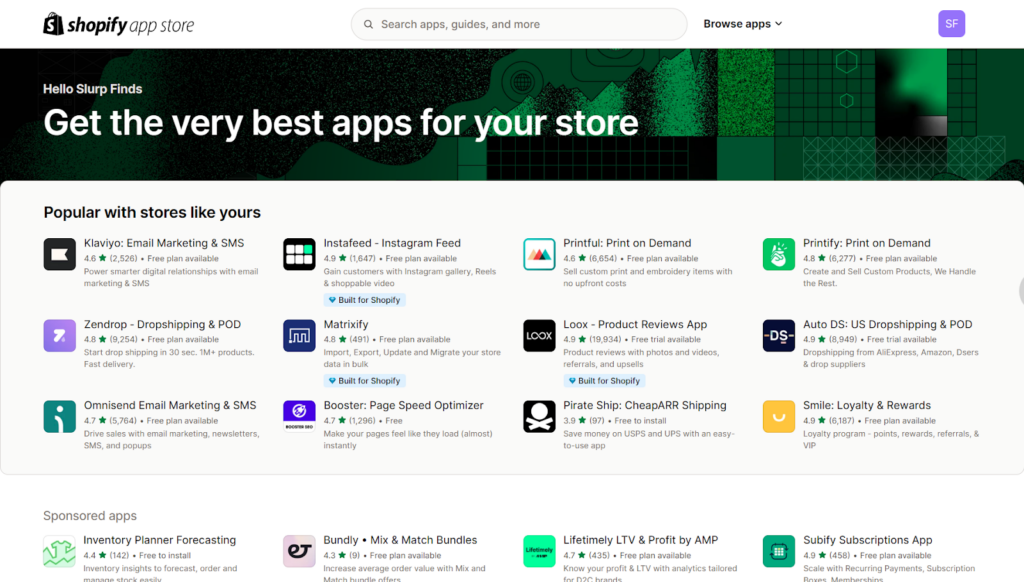
Shopify offers a vast ecosystem of over 8,000 apps, primarily focused on improving store functionality.
This extensive collection of tools covers apps for shipping, marketing, inventory management, and customer support. On top of that, all these apps are tested by Shopify to work well with the platform, offering businesses a high degree of customization and flexibility to improve their storefronts.
The Shopify App Store offers several tools to help merchants find the perfect app.
- Merchants can compare up to four apps side-by-side to easily evaluate features and pricing.
- Additionally, the store allows users to filter apps specifically built for Shopify and to refine search results by category and feature, streamlining the app discovery process.
Wix App Market
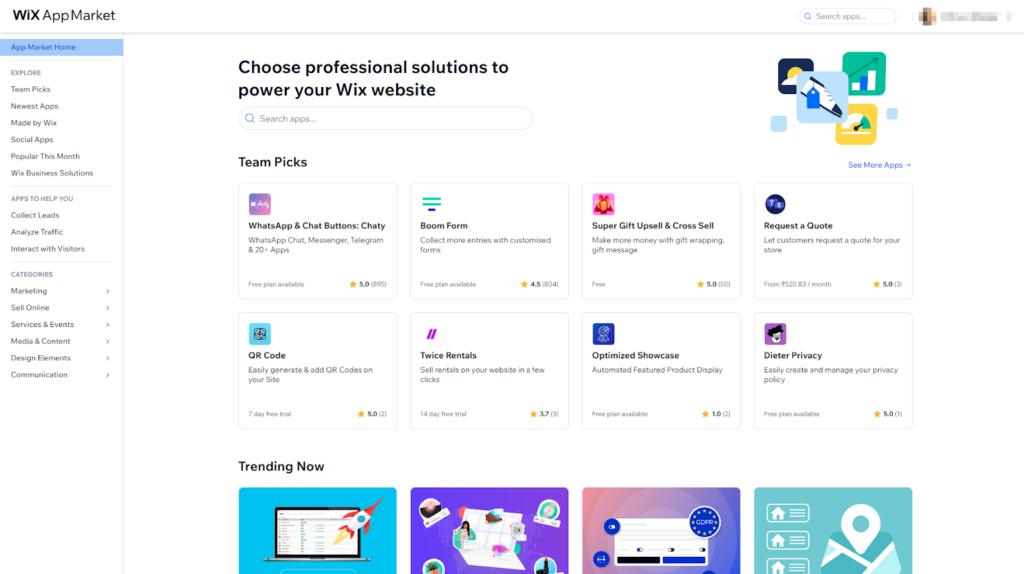
Wix’s App Market offers a smaller selection of around 500 apps, which might be limiting for businesses with complex ecommerce needs. While it provides a diverse range of apps covering both eCommerce and general website functionalities like design, marketing, and booking services, its focus on eCommerce-specific tools is narrower compared to Shopify.
With Wix App Market, you’ll find some free apps that are built specifically by Wix.
6. Shopify Vs. Wix – Email Marketing Tools
Wix and Shopify both offer email marketing tools. But the real question is, what makes them stand apart?
Okay, let’s gain some information.
When you choose Wix as your eCommerce platform, you get access to a free email marketing tool, with around 200 free credits per month. This number may appear small, however, if you have a short customer list, this can help you test out how email marketing works.
Later when you choose to launch your campaign with all the preparations and base knowledge, you get an option to upgrade to premium plans. Here I’ve added a screenshot for a better understanding of their available plans.
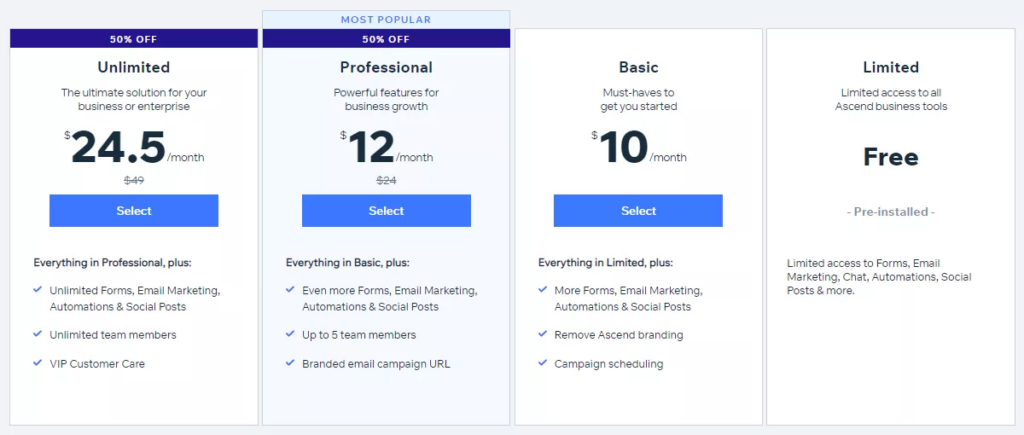
If we talk about Shopify’s email marketing tool, it’s named Shopify Email and is free to install and send 10,000 free emails each month. Let me elaborate on it more.
Suppose you have 12,000 subscribers to your email list and want to send a monthly newsletter to all of them. As per plan, the first 10,000 emails you send per month are covered. However, you’d need to pay for the additional 2,000 emails [(12,000 total emails) – (10,000 free emails) = (2,000 emails)]. And Shopify Email charges $1 per 1,000 emails.
So, for the additional 2,000 emails, you’d pay: $2
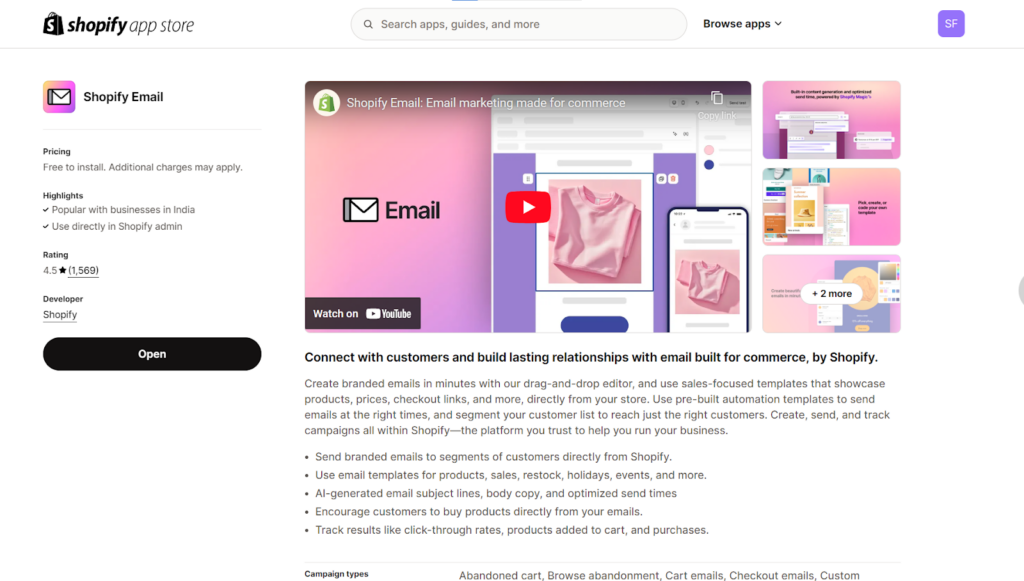
This is quite a cheaper solution when compared to Wix Email’s pricing plans.
Moreover, if we talk about key features for both of these email marketing tools, they come with drag-and-drop email builder, ready-made email templates, email automation, customer segmentation, analytics, A/B testing, and allows integration with advanced third-party tools.
7. Shopify Vs. Wix – SEO Tools
Before choosing between Wix vs Shopify, you must also consider their SEO features.
Both platforms handle basic SEO tasks well, like editing page titles, meta descriptions, headers, and robots.txt files. However, Shopify has the upper hand, especially for mobile SEO. Why?
Shopify builds highly responsive websites. Since Google favors responsive sites, Shopify gets an immediate SEO boost.
They also have automatic 301 redirect informing search engines that the page is moved, helping maintain your search rankings. Wix also has automotive redierction feature, however, its only for paid plans. If you’re on the free Wix plan, you’ll need to set them up manually in a different section of the interface.
Besides, getting a Shopify store to meet Google’s new ‘Core Web Vitals’ standards is easier. Core Web Vitals focuses on speed, responsiveness, and visual stability. Shopify store has several apps that help you meet these targets, which can boost your site’s Google search ranking.
Shopify also offers the ‘Yoast’ app for SEO, a popular tool that analyzes your site’s content and suggests steps to improve its search engine performance. Unlike most hosted platforms, Shopify allows integration with Yoast, similar to WordPress, though with a fee. Wix also comes with a tool named ‘SEO Wiz,’ which is ideal for SEO beginners. It guides you through questions about your site and generates a checklist of SEO tips to enhance your site’s visibility.
Remember, no matter which platform wins in technical SEO, your site will rank well if you’ve done solid keyword research, your content is top-notch, and you’ve built plenty of quality backlinks.
8. Shopify Vs. Wix – Customer Support
Having good support matters when picking an eCommerce platform. This is because you’ll inevitably face challenges or have questions while setting up or running your online store.
Shopify takes a more proactive approach with 24/7 live support via email, chat, and phone. Its extensive help center and active community forum offer additional resources. Even when Shopify has little learning curve you might find multiple in-depth tutorials by the platform itself and online enthusiastic (on Youtube).
Also, their round-the-clock support and community engagement can be valuable for you as a merchant.
On the other hand, Wix also provides a good foundation of support with a comprehensive knowledge base and efficient email and callback support during business hours. Also, customers on the VIP plan has an option to get priority assistance from Wix team members.
Lastly, both platforms offer helpful resources, but Shopify’s 24/7 availability and community support give it a slight edge for those seeking constant assistance. Wix’s strong knowledge base and priority support for VIP customers are beneficial for users who prefer email communication and value additional perks.
9. Shopify Vs. Wix – Payment Processing
Both Shopify and Wix offer a range of payment options for online stores, but they differ in breadth and flexibility.
Shopify provides a more extensive selection of payment methods, including popular options like debit/credit cards, digital wallets (Apple Pay, Google Pay, Amazon Pay), and even cryptocurrency through BitPay. This variety caters to a wider customer base. Additionally, Shopify integrates with hundreds of third-party payment providers, though this often comes with extra fees.
Also, Shopify offers its own payment processor, named Shopify Payments that accepts payments from widely known payment gateways.
Wix offers a solid selection of payment methods, covering major credit cards and some digital wallets. While it lacks the extensive options of Shopify, it provides sufficient choices for many businesses. Wix also supports popular third-party payment providers like PayPal, Stripe, and Square.
When it comes to payment processing, transaction fees are necessary factor to consider. Let’s gain information if Shopify and Wix charge any transaction fees.
Shopify Transaction Fees
- Standard fee — around 2.9% charged by payment gateway + $0.30 per-transaction charged by Shopify.
Its necessary to consider that the standard per-sale fee charged by Shopify will decrease as you opt for higher-tier plans. Also, when you integrate Shopify Payments for accepting payments, Shopify won’t charge additional per-sale fees.
Wix Trasaction Fees
- Standard fee: 2.9% + $0.30 per transaction.
Both Shopify and Wix charge almost same base transaction fee. However, Shopify offers the potential for reduced rates based on the chosen plan, providing some flexibility for merchants.
In addition, Shopify Payments is quite convenient for merchants.
10. Shopify Vs. Wix – POS Capabilities
First of all, let’s gain basic understadning on what is POS, and if your eCommece business will need that.
POS stands for point of sale. It refers to the time and place where a retail transaction is finalized. This can be a physical location like a cash register in a store, or a digital checkout process on an online store. POS is a stystem that handles everything from calculating the bill to accepting payment and generating receipts.
If you’re looking to sell online and offline, POS can be your best investment. Let me explain why.
This because POS system offers a unified platform where you can manage all your sales data (such as: trasactions, inventory, and more), regardless of whether they take place, online or in your physical store.
Shopify has long focused on integrating powerful point-of-sale (POS) capabilities directly into its platform. From dedicated POS support to a hardware store and detailed reporting, Shopify’s POS features are robust and seamlessly integrated. You can access these comprehensive tools on their basic ‘Starter’ plan or a higher tier.
Shopify offers 2 pricing packages for their POS integration.
- POS Starter — $5 per month for selling on social media
- POS Retail (POS Pro) — $89 per month with unlimited POS logins
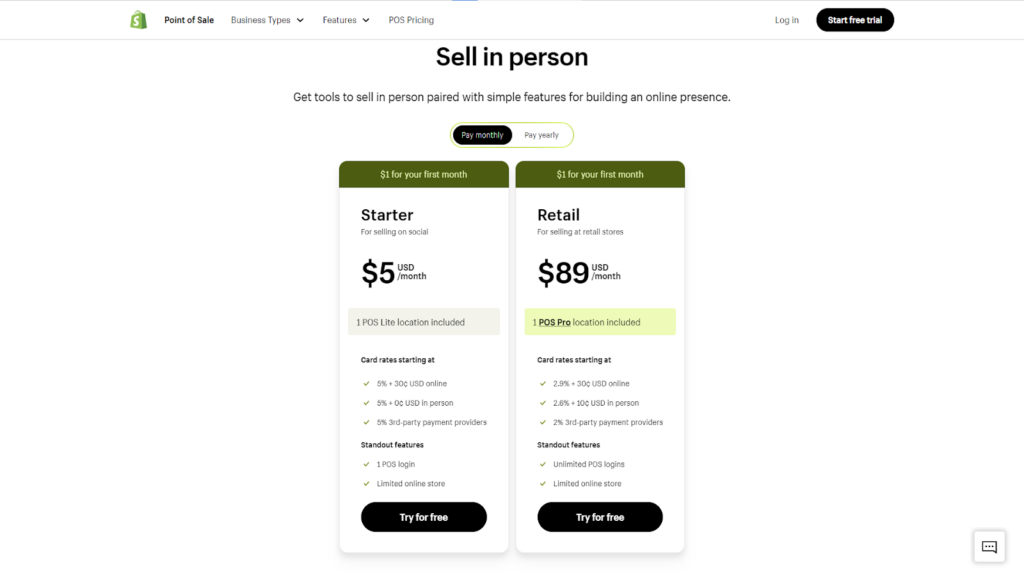
Recently, Wix has expanded its POS options beyond third-party integrations. It has introduced its own system, Wix Point of Sale. Similar to Shopify’s POS solution, Wix POS offers great features that help unify offline and online sales.
Wix’s POS system simplifies POS service without additional costs beyond their standard pricing plans.
However, Wix POS is currently limited to the USA and Canada, and it’s only available to selected users. If you’re outside these regions, you can still use Square or SumUp as POS solution for your Wix site.
Here are key differences to remember:
- Shopify POS: Powerful and works almost anywhere, but might cost more.
- Wix POS: Can be easier on the wallet depending on your needs and location.
Okay, so until now we’ve gained quite a lot information on both the platfroms. And we have clear vision to what Shopify and Wix offers as eCommerce platforms. However, your doubts on the best platform may still be constant.
This is because choosing between Shopify vs Wix isn’t easy until you understand your business needs. So, let’s learn about critical business parameters in the next section to find the best platform for you.
Understanding Your eCommerce Business Needs
Both Wix and Shopify are excellent platforms, but the key to choosing the right one lies in clarifying your eCommerce goals from the start. To find the right platforms for your eCommerce needs, take a moment to consider a few key areas we’ve covered below.
1 — Are you just starting your online business, or do you already have an established store?
Start by understanding where you stand. Whether you’re launching a new business or have a well-established store, considering your business stage will help you make right decision between platforms.
If you’re a well-established business looking to expand your reach online, then Shopify can be your go-to solution. It seamlessly handles large inventories and comes with greater features with its higher tier plans to accommodate growth. On top of that, their most advanced plan, Shopify Plus, might even be the perfect fit for your needs.
However, if you’re just starting out and want a simple platform to have an online presence, Wix is a great choice. It is user friendly platform with an easy learning curve that allows you to build a basic online store without needing extensive technical knowledge.
2 – What is the current size of your product catalog? Do you anticipate significant growth in the future?
When choosing a platform, its necessary for look for catalog support.
Shopify can handle extensive inventories efficiently if you have a large catalog or expect substantial growth. it also offers scalability and management tools that cater well to businesses with hundreds or thousands of products. However, a large and ever-expanding inventory with complex variations might feel cumbersome on Wix.
If you’re just starting with a limited product range, Wix can be a handy option to fullfill your needs without unnecessary complexity or cost. For businesses anticipating extensive growth, Shopify’s scalability is a smarter long-term choice.
3 — Do you have any coding experience?
Your coding experience determines how easily you can customize and manage an online store.
Majorly, coding experience won’t be a hurdle with either platform. Both Wix and Shopify are designed for ease of use, allowing you to build and manage your store with drag-and-drop builders and easy interfaces. However, these may allow you to build a basic to medium-level store. If you wish to build a truly unique store, coding is a way to do it. With additional coding, you can achieve more control over the look and feel of your store by making advanced customizations.
So, consider your expertise in coding as well.
4 – Do you need a highly customized storefront experience to differentiate your brand?
Customizations are way to build an online store that differs from every other.
Shopify offers the best options for extensive customization. Whether tweaking design elements or integrating complex functionalities, Shopify caters to your specific needs, ensuring a seamless user experience. On the other hand, Wix also offers good customization features, but Shopify excels when you need advanced levels of personalization to match your brand’s vision and customer expectations.
5 — What is your budget for setting up and maintaining your e-commerce platform?
Budget is significant for setting up and maintaining your eCommerce platform. So, you must weigh your options carefully. Wix as a platform comes with lower upfront costs, making it attractive if you start on a tighter budget.
However, Shopify might be more beneficial in the long run due to its comprehensive features and scaling capabilities, which could lead to higher returns on investment over time. The trick is to find the balance between initial expenses and long-term growth potential.
6 — Are you looking for multilingual features?
If your business caters to different regions in world, you may consider multilingual features. Both Wix and Shopify support multilingual features for your eCommerce needs. Shopify allows up to 20 language versions starting from the Basic Shopify plan. Wix offers ‘Wix Multilingual’ across all plans. This feature supports site versions in over 180 languages, making it a greater choice.
7 — Do you seek tax calculation in your eCommerce platform?
Managing taxes in eCommerce can be daunting, especially across multiple jurisdictions.
Wix offers tax calculation through the Avalara app, which helps apply accurate rates. Shopify includes built-in automatic tax calculations with no usage limits. This makes Shopify a superior choice for seamless tax management, particularly for businesses across various regions.
When discussing Shopify vs. Wix, each has its own strengths. Choosing between them depends on the taxation rules in your region. Consider your business compliance needs and your comfort level with eCommerce tools.
;
Those were some key areas to look at before you make your mind on right platform for your business. There may be many other areas for you to consider, so, think on each area that hold importance for your dream online store.
It’s time for a final decision making. Let’s do that in next section.
Is Shopify or Wix Better For Your eCommerce Business?
It depends.
Shopify and Wix are both top picks for starting an online store. However, your final choice depends on your store type, needs, and experience.
- If you want a cost-effective option that helps you build an online store with easy drag and drop builder, pre-made themes, apps, high-degree customization, POS, and endless scalability options — Shopify is best fit.
- If you want an affordable option, and want to start selling online with limited products, easy setup and maintenance — Wix can be your best choice.
Both platforms have strengths, however, your ideal platform will depend on what your business needs.
I hope this article helped you gain information on both of these platforms and choose the best one based on your needs. If you have any questions or queries, you can type them in the comment section.
Moreover, If you’re choosing to get ahead with Shopify, seeing its greater strengths, our Shopify experts can help you get started. Book an appointment with us. 😀
Shopify Vs. Wix — FAQs
1. Should I start with Wix or Shopify for my small business?
Shopify is your best choice if you’re an established business aiming to expand online, especially with a large inventory. For smaller businesses just starting out, Wix is a fantastic choice to get your online presence up and running.
2. Can I design my website exactly how I want with Wix or Shopify?
Yes, both Wix and Shopify offer extensive customization options. Wix provides drag-and-drop tools for more design flexibility, while Shopify offers customizable themes and advanced coding options for a tailored look.
3. Does Wix or Shopify have more apps to add features to my store?
Both Wix and Shopify have app markets to boost your website’s functionality. However, there’s a big difference in scale: Wix offers about 500 third-party apps, while Shopify boasts a whopping 8,000+ apps.
4. Is Wix safe for handling online transactions?
At Wix Payments, your financial transactions are secure with the Payment Card Industry Data Security Standards (PCI DSS). It’s like a digital fortress required by credit card companies to keep online transactions safe from identity theft, fraud, and data breaches.
5. Is it worth switching from Wix to Shopify for my business?
Choosing between Shopify and Wix comes down to what you need. Shopify suits eCommerce scalability, ideal for large-sized businesses. Meanwhile, Wix is better for newcomers due to its wallet-friendly options and design flexibility. Switch to Shopify if you’re planning for a serious business growth.
6. What are the drawbacks of using Wix for my online store?
Wix offers basic analytics with limited depth and struggles with slow page loads. It also doesn’t allow template changes after going live, which can be restrictive for site customization sometimes.






Post a Comment
Got a question? Have a feedback? Please feel free to leave your ideas, opinions, and questions in the comments section of our post! ❤️